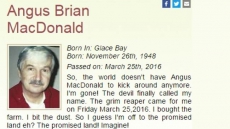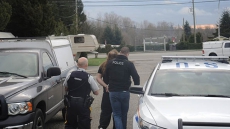VANCOUVER — The Canadian and British Columbia governments are complicit in fuelling Vancouver's housing crisis as foreign Chinese buyers continue to shut local residents out of the market, a new study says.
Josh Gordon, the study's author and assistant professor in the School of Public Policy at Simon Fraser University, said people whose dreams of owning a home are being crushed because they can't compete with foreign investors no longer accept "distraction" excuses such as low interest rates for the state of the super-heated market.
"People recognize what's going on, and they're willing to call a spade a spade," he said, stressing that such views are based on reality, not racism.
His report compiles a number of other studies, including data on home-buying trends, population density, the cancelled immigrant investor program, and American research on the same issue.
Gordon said his report blames Vancouver's housing crisis on foreign buyers, particularly from China, because "this is where the evidence points, not because of some anti-Chinese animus."
Chinese investors have also spiked home prices in the Toronto region, but Vancouver has seen the highest rise in real estate due to the influx of foreign money reaching an unprecedented level in the last year, he said.

Gordon noted that other countries, including Australia and Singapore, have created policies for foreign homebuyers to protect their own citizens but that hasn't happened in Canada.
The average sale price of a single-detached home in Metro Vancouver was $1.4 million in April, a 30-per-cent increase from a year earlier, according to the Real Estate Board of Greater Vancouver.
The report, titled "Vancouver's Housing Affordability Crisis: Causes, Consequences and Conclusions," says political inaction has allowed the problem to grow.
"By linking the crisis unambiguously to foreign ownership and investment, documenting the major harms of the affordability crisis, and proposing a policy route out of the current mess, the report hopes to harness the city’s resentment and dispel its resignation."
Mobilized and informed residents can ideally hold political leaders accountable, the report says.
Nazma Lee said she and her husband Lloyd have become increasingly frustrated because they can't afford a home as they continue renting a two-bedroom condo with their two children.

Lee, a lawyer, and her husband, an engineer, were born and raised in the Vancouver area but fear that like other residents they may have to leave to buy a home elsewhere.
"I do think Vancouver is being affected by massive amounts of foreign investment," she said.
Lee said it's time for the B.C. and federal governments to take "drastic measures," including tracking the source of money for real-estate investment to deal with possible money laundering.
"I feel like there's a little bit of wilful blindness and people know what's going on but nobody wants to look into it because so many people are making money off real estate in Vancouver," she said.
In March, Premier Christy Clark said the province will impose regulations to end the "shady" practice of contract flipping, allowing real estate agents to flip a property multiple times at higher prices before a deal closes as they continue making commissions while buyers avoid paying property taxes.
This year's federal budget allocated $500,000 over the next year for Statistics Canada to develop methods to track ownership of Canadian homes by foreign homebuyers.
The Opposition New Democrats have put forward two private member's bills, one calling for a two-per-cent speculation tax and the other to close a loophole allowing investors to avoid paying property transfer tax.

NDP housing critic David Eby said the province's commitment to reintroduce a requirement for homebuyers to disclose their citizenship on land title documents is unlikely to make any difference.
"The idea that if people are misrepresenting their residency on anti-money laundering forms are going to suddenly give you frank and honest information on land titles form is a bit silly."
Eby said he has met with business owners who are struggling to recruit and retain professionals because the high cost of housing is deterring people from moving to the city.
"Housing is going to be a central issue for us," he said of the matter that will potentially drive the NDP's election agenda before voters go to the polls in May 2017.
"It's not just Metro Vancouver that's facing this challenge," he said. "There are rental vacancy rates across the province of less than one per cent."
Eby said he supports a BC Affordability Housing Fund, proposed by the Sauder School of Business at the University of B.C., to collect a 1.5-per-cent real estate surcharge from non-resident property owners, with the money generated to be distributed to residents.
Tom Davidoff, director of the Centre for Urban Economics and Real Estate at Sauder, said that at a tax rate of $15,000 for a house worth $1 million, a minimum of $100 million a year would be raised in Vancouver alone.

He said 40 academics at the University of B.C. and Simon Fraser University have endorsed the fund, and the idea was presented to provincial government officials earlier this year.
"It's very important that we see outside investment as an opportunity," he said. "It can only be a bad thing if politicians are too stupid and lazy to not make sure everybody benefits."



